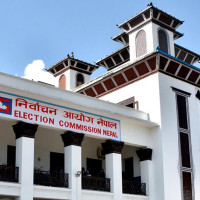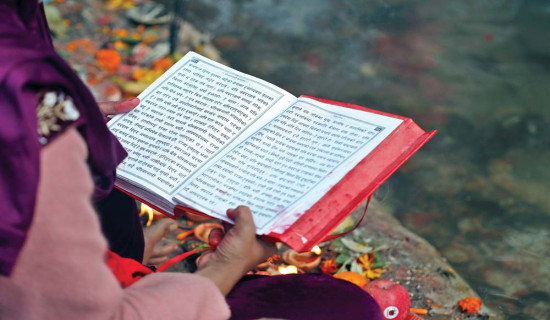- Saturday, 28 February 2026
Gundu farmers busy making Makhamali garlands for Tihar
Kathmandu, Oct. 23: As Tihar, the second biggest festival of Nepali people, is around the corner, the farmers of Gundu in Suryabinayak Municipality-7, Bhaktapur, are now busy picking Makhamali (globe amaranth) flowers and making garlands.
Gundu is famous for growing Makhamali flowers.
Makhamali garlands hold a significant cultural value during the day of Bhai Tika, so demand for Makhamali flowers is high during the Tihar festival.
Makhamali and Marigold flowers worth millions of rupees are produced in Suryabinayak Municipality.
Makhamali flower has been cultivated commercially in Suryabinayak Municipality Ward No. 7 for the last 40 years. However, it came into the limelight only after the local government included floriculture in its plan.
Pahalman Nagarkoti started commercial cultivation of Makhamali flowers about 40 years ago. The floriculture started by him has been developed as a model commercial farming in the ward.
Recalling the struggles they faced while selling the flowers in the past, Dev Kumari Nagarkoti, wife of Pahalman Nagarkoti, said, “Local traders used to chase them away when they took flowers to Pashupati, Asan, Indrachowk and other areas of Kathmandu and Bhaktapur to sell.”
She further said, “Despite the challenging circumstances, my husband sold flowers and educated the villagers about flower business. He not only cultivated flowers but also attracted the people of Gundu to the floriculture business”.
Today, due to his contribution, the farmers of Suryabinayak Municipality Ward No. 7 have adopted floriculture as their main source of income.
At present, floriculture has made it easier for every family in Suryabinayak-7 to generate income. They do not experience a shortage of money for health, education, household expenses, marriage ceremonies, rituals, puja and festivals.
Late Pahalman Nagarkoti’s daughter Urmila Nagarkoti, a successful flower entrepreneur and the Chairperson of the ward-level Disabled Coordination Committee, said that the floriculture business has helped people generate substantial income.
She said, “Forty years ago, when my father cultivated Makhamali flowers, he used to sell a garland for 25 paisa. Now, we sell each garland of the Makhamali flowers for Rs. 20 to Rs. 25,” she said.
I have prepared about 4,000 garlands for this year and hope to create more before Bhai Tika, she said.
The ward covers an area of 5.94 square kilometres and flowers are grown in around 50 hectares of land here. The Gundu area is located in the southern part of the Araniko Highway and has the facility of paved roads and transportation facilities.
The municipality has been providing grants for each farmer involved in floriculture through the Sana Kishan Agriculture Cooperative Ltd.
The Cooperative has been providing Makhamali and Marigold flower saplings at an 80 per cent subsidy, plastic for tunnel farming, tools, irrigation facility, seeds and hand tractors for the convenience of the farmers, said Ajay Mani Risal, manager of Sana Kishan Agriculture Cooperative Ltd.
More than 428 farmers have benefitted from the grant, said Risal.
“We have produced 65,000 saplings and distributed them among the farmers. The grant provided for floriculture has encouraged other farmers to stay in or switch to floriculture business,” he said.
There is no uniformity in market prices of Makhamlai garland. Middlemen take more benefit in the flower business than the actual farmers, said Rabindra Sapkota, chairman of Gundu Ward No. 7.
“We are also trying to remove middlemen from the flower business so that the farmers get fairer prices for their produce,” he added.
However, there is limited official data about the volume of transactions and the amount of money generated because businessmen buy flowers directly from the flower farmers, away from government oversight and intervention, he said.
“Not only Nepalis living in Nepal but also those living outside the country demand Makhamali during Tihar. This drives up demand and presents income opportunities,” said florist Anita Basnet.
Basnet herself has been supplying flowers to Nepalis living in countries like the United Arab Emirates, South Korea, Japan, the United States and other nations, mainly through personal contact. Normally, farmers start picking flowers from mid-August and use cold storage to keep them fresh till Tihar.
















